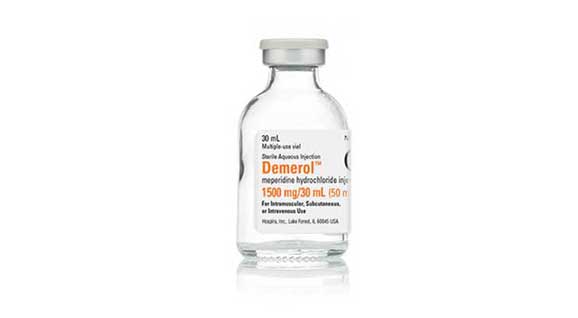Demerol Addiction | Demerol Abuse In Ohio

Medically Reviewed By: Kimberly Langdon, M.D.

Written by: Dr Jason Martin Psy.D., LCPC
Meperidine (brand name Demerol) is a relatively weak, short-acting synthetic opioid narcotic with only around 10 percent of the potency of morphine. However, the drug is strong enough to be deceptively addictive if misused

There is a misconception that strong opioids/opiates like heroin, fentanyl, and oxycodone are dangerous while less-potent opioid painkillers like codeine, tramadol, and meperidine are safe and low-risk.
In reality, however, lower-potency drugs like Demerol are frequently abused and can act as a gateway to drug addiction or overdose. Demerol can cause severe physical dependence and psychological dependence with repeated abuse.
What Is Demerol?
Demerol is a brand-name prescription analgesic (pain medication) containing the generic drug meperidine hydrochloride, also known as pethidine. It comes as an injectable solution, oral syrup, and white circular oral tablet.
On the street, Demerol is often referred to by the street names “Dillies,” “D,” and “Dust.”
Demerol Classification
Like other prescription opioid drugs, Demerol/meperidine is classified as a Schedule II controlled substance with a high risk for abuse and physical or psychological addiction.
Demerol is most often prescribed in hospital settings where it is used to manage moderate to severe pain over short periods of time or prescribed to treat chronic pain over a longer period.
Demerol Abuse
Any time Demerol or other opioid pain relievers are taken in any other way than prescribed and intended by a medical professional, it is considered drug abuse.
This includes:
- sharing or selling Demerol to those without a prescription
- taking more than your prescribed dosage or taking it more often
- tampering with it or mixing it with other substances to increase its euphoric effects
- obtaining Demerol prescriptions under false or misleading pretenses
Sometimes those who use Demerol will also chew the tablets or crush them and swallow them to increase the speed of absorption.
Otherwise, Demerol medications have been crushed and injected, plugged (taken rectally), or snorted, despite these methods of ingestion increasing a person’s risk of adverse effects, including overdose.
Effects Of Demerol Abuse
Some short-term side effects of Demerol use may include:
- analgesia (pain relief)
- calmness
- constipation
- dizziness
- dry mouth
- feelings of pleasure
- flushing
- headache
- lightheadedness
- mood changes
- nausea
- stomach pain or cramps
- sweating
- vision changes
- vomiting
- weakness
Demerol side effects often resolve as the body adapts to the medication. Severe adverse reactions, including allergic reactions, are also possible.
Demerol Overdose
Demerol may cause life-threatening overdose symptoms in high doses or if it is mixed with other common drugs of abuse including depressants like alcohol, benzodiazepines, or sedatives, or stimulants like meth and cocaine.
Common symptoms of Demerol overdose may include:
- drowsiness, confusion, and disorientation
- extreme sleepiness and inability to stay awake
- loss of consciousness
- slow, shallow, or stopped breathing (respiratory depression)
- drop in blood pressure
- low body temperature, cold clammy skin, and bluish lips or fingertips
- irregular or slow heart rate
- convulsions or seizures
- coma
If you believe a Demerol overdose may have occurred, administer naloxone (if you have it), call for help, and stay with the victim while providing first aid until first responders arrive.
Meperidine Interactions
In addition to additive effects with other central nervous system depressants, meperidine should never be taken with MAO inhibitors due to the risk of a severe drug interaction.
In addition, using meperidine with other drugs that increase serotonin levels can increase the risk of serotonin syndrome, a potentially serious condition.
Meperidine is also known to interact with certain antifungal, antibiotic, and anti-seizure medications, which may increase or decrease the drug’s duration and effectiveness.
Signs Of Demerol Addiction
The longer Demerol is taken, the more the body will adapt to its effects, leading to tolerance, dependence, and eventually substance use disorder or addiction.
Signs of opioid addiction can include:
- unstable mood swings
- frequent illness
- increased anxiety, depression, and symptoms of mental illness
- inability to feel pleasure from normal sources
- emotional withdraw from friends and family members
- lack of interest in hobbies or personal obligations
- financial hardship
- poor hygiene, nutrition, and self-care
- deception, theft, and other drug seeking behaviors
- increasing dosage and frequency of use
- withdrawal symptoms when you stop use
Demerol Withdrawal Symptoms
After long-term use of Demerol, withdrawal symptoms are likely to occur after the drug is discontinued. While physical dependence and withdrawal can occur even after prescribed use, symptoms may be worse if the drug was abused.
Demerol withdrawal symptoms may include:
- intense drug cravings
- insomnia
- anxiety and agitation
- abdominal cramping
- nausea and vomiting
Opioid withdrawal symptoms can lead to further drug use and a higher risk of relapse. To avoid withdrawal, your healthcare provider may taper you off the medication or advise you to attend a medical detox program.
Demerol Addiction Treatment
Treatment for prescription drug addiction often begins with detoxification. Medical detox programs provide a supportive and medically supervised environment for the worst part of the withdrawal process.
Once detox is complete, participants can begin a personalized treatment program that involves outpatient treatment or inpatient treatment, individual and group therapy sessions, behavioral therapy, peer support groups, and long-term aftercare support and case management.
Many participants also benefit from specialized medication-assisted treatment programs using naltrexone, buprenorphine, or methadone. For information on our inpatient treatment options, please contact us today.
FAQ
Does Demerol Show Up On A Drug Test?
Yes, Demerol can show up on urine, oral fluid, saliva, and hair follicle tests. Testing positive for Demerol use may result in a referral to an Ohio opioid addiction treatment program.
Learn more about Drug Testing For Demerol
How Much Does Demerol Cost On The Street?
How much Demerol costs on the street depends on your location. However, the average price of Demerol in Ohio tends to range from $2.50-$6.00 for a single 50 mg/100 mg tablet.
Learn more about Demerol Street Value
- Food and Drug Administration (FDA) — Demerol https://www.accessdata.fda.gov/drugsatfda_docs/label/2011/005010s050lbl.pdf
- National Library of Medicine: MedlinePlus — Meperidine https://medlineplus.gov/druginfo/meds/a682117.html
- Substance Abuse and Mental Health Services Administration (SAMHSA) — Opioid Use Disorder Facts https://store.samhsa.gov/sites/default/files/d7/priv/opioid-use-disorder-facts.pdf

